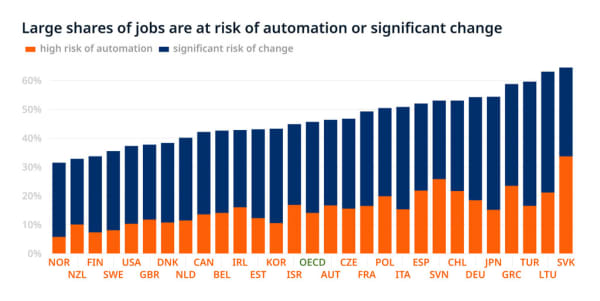Is Labour Day relevant in the age of machines?

When May 1 was instituted as International Workers' Day or May Day or Labour Day to commemorate the Haymarket affair of 1886, the idea was simple-establish the 8 hour work day as a rule, honour the contribution of working men and women for the class demands of the proletariat, and while doing so, propagate universal peace. The day was meant to be a recognition for the countless hours of toil by workers across the globe, urging ‘the proletarian organizations of all countries to stop work on 1 May, wherever it is possible without injury to the workers.’
Almost 133 years later, while we still continue to celebrate this day, one cannot help but notice that these celebrations are foreshadowed by the prospect of many such proletariat jobs being taken over by bots, robots, and machines. Just last week, a report from Paris-based group OECD reiterated what we have been hearing frequently-that automation, robots and globalization are rapidly changing the workplace and governments must act fast and decisively to counter the effects or face a worsening of social and economic tensions.
As per the report, almost half of all jobs could be wiped out or radically altered in the next two decades due to automation. Safety nets and training systems built up over decades to protect workers are struggling to keep up with the “megatrends” changing the nature of work, as per the OECD. While some workers will benefit as technology opens new markets and increases productivity, young, low-skilled, part-time and gig-economy workers are vulnerable.
May Day or Judgement Day?
The report points out that automation may be the most important issue for labor markets in the near future. The organization has highlighted a squeeze on the middle classes, future jobs losses from technology and widespread dissatisfaction in rich countries.

Also, employment in the manufacturing sector, in particular, has been on a long-term path of decline (shrinking by 20% over the period 1995-2015), while the share of jobs in the service sector has been steadily rising (growing by 27% over the same period). In emerging economies, there has been a substantial decline in the share of agricultural employment.
These changes in employment will hit some workers more than others. At risk are particularly young people with lower levels of education and women who are more likely to be under-employed and working in low paid jobs.
In fact, research by Oxford University looked over 700 jobs in the US and found that 47% of them could be done by machines within a decade. So even a portion of a CEO’s job is not immune to automation, let alone the proletariat class.
As one pores over these stats, one cannot help but wonder that after 50 years, how many of us will have jobs to celebrate May Day? Or rather, how many of us will be celebrating May Day with more robots and bots on our side as our co-workers? Will those factories which would have switched to 100% automation care to give their machines an off and celebrate May Day? In our highly automated and mechanized future, does the concept of celebrating a May Day to honour the proletariat hold any relevance, given these machines might become the next proletariat?
The three-hour shifts: Will the Keynesian dream prevail?
Before we drown ourselves in gloom, there might be still hope or an alternative reality in line with what John Maynard Keynes predicted in his essay “Economic Possibilities for our Grandchildren” in 1930. In that brave and bold essay, Keynes had forecasted that as technology improved, in 100 years, humans would have solved the economic problem of subsistence. He predicted that we would be working three-hour shifts, five days a week and that our standard of living would be 4x-8x of that in 1930.
Keynes had typically referred to the pain being creative by technology displacing jobs and surmised that is only temporary. He said, “
“For the moment the very rapidity of these changes is hurting us and bringing difficult problems to solve. Those countries are suffering relatively which are not in the vanguard of progress. We are being afflicted with a new disease of which some readers may not yet have heard the name, but of which they will hear a great deal in the years to come--namely, technological unemployment. This means unemployment due to our discovery of means of economising the use of labour outrunning the pace at which we can find new uses for labour. But this is only a temporary phase of maladjustment. All this means in the long run that mankind is solving its economic problem.
Kenyes had thus concluded that given the rate of technological progress ‘assuming no important wars and no important increase in population, the economic problem may be solved, or be at least within sight of solution, within a hundred years.’
The main problem in front of mankind, he had argued, was will human beings ‘use the freedom from pressing economic cares, how to occupy the leisure, which science and compound interest will have won for him, to live wisely and agreeably and well.’
A Keynesian reality seems just like the happy ending for the temporary pain being caused by the advance of technology. And it might not be too much off-track as well. While technology has been displacing jobs, it has also been simultaneously creating jobs that were unheard of before. The fact remains that though machines will take some jobs in the beginning, yet the jobs created by automation will also keep rising in the coming few years. In that case, if we ever attain the Keynesian utopia of working only three-hour shifts, five days a week, there may not be a need to celebrate May Day to endorse 8-hour shifts. Either way, in the age of machines, the future of May Day is also poised for a change.
Image Credits: OECD

















